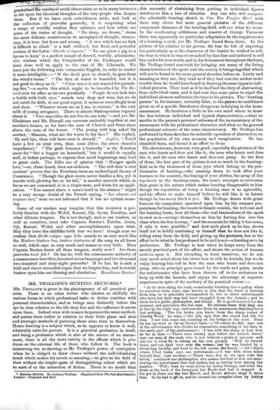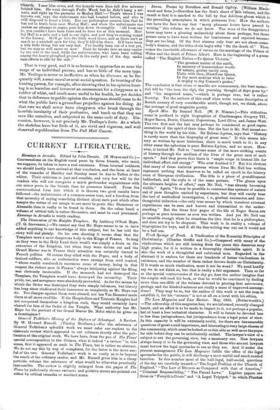MR. TROLLOPE'S HUNTING SKETCHES.* Mn. Tam-Lore is great in the
physiognomy of all practical pur- suits. There is no other writer who catches so skilfully the various forms in which professional tasks or duties combine with personal characteristics, and so brings men distinctly before the eye in close relation to the life they live and the influence it exerts upon them. Indeed even with women he pursues the same method, and paints them rather in relation to their little plans and aims and strategic methods of pursuing those aims than in themselves. Hence hunting is a subject which, as he appears to know it well, admirably suits his powers. It is a practical profession in itself, and being a profession which is also of the nature of an amuse- ment, there is all the more variety in the effects which it pro- duces on the external life of those who follow it. The book is interesting too as showing us Mr. Trollope's power of conception when he is obliged to draw classes without the individualizing touch which makes his novels so amusing,—to give us his field of view without the bright spots of distinguishing colour which are to most of us the attraction of fiction. There is no doubt that
• iihisting 3ketehes. By Anthony Trollope. (Reprinted from The Pal Nati Gamete.) London: Chapman and idall.
this necessity of abstaining from putting in individual figures involves to him a loss of stimulus. Any one who will compare the admirable hunting sketch in Can You Forgive Her? with these very clever but more general pictures of the different component elements of the hunting-field, will see what we mean. In the overbearing selfishness and reserve of George Vavasour there was apparently no particular adaptation 'to the requirements. of a hunting sketch, yet Mr. Trollope- found them there. In the picture of his relation to his groom, the fear he felt of inquiring too particularly as to the character of the hunter he wished to sell, the way in which he was overreached by that fear and induced to sell him under his true worth, and in his demeanour throughout the hunt, Mr. Trollope found materials for bringing out many of the living characteristics of the sport and the society it brings together which will not be found in the more general sketches before us. Lively and amusing as they are, they read as if they had coat the author more trouble than he would have found in drawing thesame types in indi- vidual pictures. They read as if he had had the duty of abstracting from individual cases, and it had cost him some pains to expel the individual element and retain the type in his picture. The hunting parson' is, for instance, certainly faint, to the picture he could have given us of a specific Barchester clergyman indulging in the same amusement. He hesitates a little in his own mind where to draw the line between individual and typical characteristics,—what to ascribe to the parson's personal estimate of the inconsistency of the amusement with his professional character, and what to the general professional estimate of the same inconsistency. Mr. Trollope has performed in these sketches the scientific operation of abstraction on the population of his own memory and imagination. He has classified them, and found it an effort to do so.
The sketches are, however, very good, especially the pictures of the man who hunts and does not like it, the man who hunts and does. like it, and the man who hunts and does not jump. In the first. of these, the best part of the picture is not so much in the hunting- field as in the treatment of those joys which belong to the pre- liminaries of hunting,—the running down to look after your hunters in the country, the buying of your clothes, the array of the top-boots in the dressing-room, the man's attempts to overcome that grain in his nature which makes hunting disagreeable to him though the reputation of being a hunting man is so agreeable, and his efforts to make himself believe he will like it in future though he has never liked it yet. Mr. Trollope draws with great humour the compulsion exercised upon him by the summer pre- parations for hunting, the boasts to female cousins, the red coat and the hunting boots, how all these—the real fascinations of the sport to such men—avenge themselves on him by forcing him into the chase when the fox is away, " and the moment for liking it has come, if only it were possible ;" and how such pluck as he has, shows itself not in boldly confessing to himself that he does not like it, riding away from the field, and giving up the pretence, but in the effort to be what he has professed to be and is not—a hunting inta by preference. Mr. Trollope is best when he keeps away from the merely practical part of the affair, and shows the action of human motives upon it. Not intending to hunt ourselves, we do not very much mind about his views how to ride to hounds, but we do enjoy hearing him tell us how the man who hunts and does not jump, who on principle goes round by the roads and gates, snubs the unfortunates who have been thrown off in the endeavour to keep up with the hounds, and enjoys the advantage of superior experience in spite of the modesty of his practical course :—
" As he trots along the road, occasionally breaking into a gallop when he perceives from some sign known to him that the hunt is turning from him, he is generally accompanied by two or three unfortunates who have lost their way and have straggled from the hounds ; and to them he is a guide, philosopher, and friend. He is good-natured for the moment, and patronizes the lost ones. He informs them that they are at last in the right way, and consoles them by assurances that they have lost nothing. ' The fox broke, you know, from the sharp corner of Granby Wood,' he says,—' the only spot that the crowd had left for him. I saw him come out, standing on the bridge in the road. Then he ran up-wind as far as Green's barn.'—' Of course he did,' says one. of the unfortunates who thinks he remembers something of the barn in the early part of the performance ; I was with the three or four first as far as that.'—' There were twenty men before the hounds there,' says our man of the road, who is not without a grain of sarcasm, and can use it when he is strong on his own ground. Well, he turned there, and ran back very near the corner; but he was headed by a. sheep-dog, luckily, and went to the left across the brook.'—' Ah l that's. where I lost them,' says one unfortunate.—' I was with them miles beyond that,' says another.—' There were five or six men rode the brook,' continuos our philosopher, who names the four or five, not men- tioning the unfortunate that had spoken last as having been among the. number. Well; then he went across by Ashby Grange, and tried the drain at the back of the farmyard, but Bootle had had it stopped. A. fox got in there one day last March, and Bootle always stops it since that. So he had to gb on, and -he crossed the turnpike close by Ashby- Church. I saw him cross, and the hounds were thou full five minutes behind him. He went through Frolic Wood, but he didn't hang a mi- nute, and right up the pastures to Morley Hall.'—` That's where I was thrown out,' says the unfortunate who had boasted before, and who is still disposed to boast a little. But our philosopher assures him that he has not in truth been near Morley Hall ; and when the unfortunate oue makes an attempt to argue, puts him down thoroughly. 'All I can say is, you couldn't have been there and be here too at this moment. Mor- ley Hall is a mile and a half to our right, and now they're coming round to the Linnoy. He'll go into the little wood there, and as there isn't as much as a nutshell open for him, they'll kill him there. It'll have been a tidy little thing, but not very fast. I've hardly been out of a trot yet, but we may as well move on now.' Then he breaks into an easy canter by the side of the road, while the unfortunates, who have been rolling among the heavy-ploughed ground in the early part of the day, make vain efforts to ride by his side."
That is very good, and it is so because it approaches so near the verge of an individual picture, and has so little of the mere type. Mr. Trollope is never so ineffective as when he discusses, as he fre- quently will, a semi-moral or semi-social question. In treating of the hunting parson, for example, after showing that in his opinion hunt- ing is as harmless and innocent an amusement for a clergyman as a rubber of whist, and much more useful to his health, he yet decides that in deference to public opinion the clergyman should cease to do what the public have a groundless prejudice against his doing. At that rate we shall never have clergymen who break through the horrible insularity of their profession, and teach us that they are men like ourselves, and subjected to the same code of duty. Dis- cussion, however, is not precisely Mr. Trollope's forte. As a whole the sketches have but little of it, are vivid and vigorous, and well deserved republication from The Pall Mall Gazette.



































 Previous page
Previous page